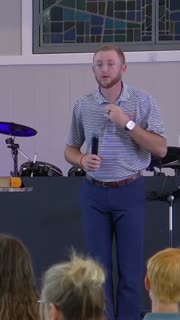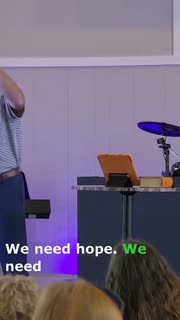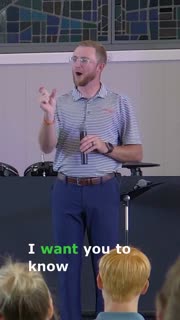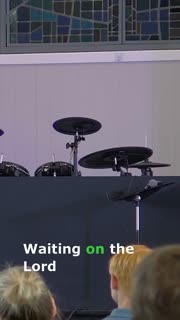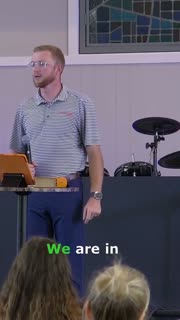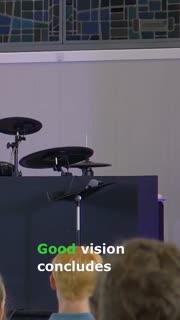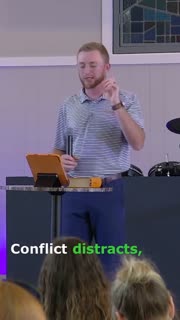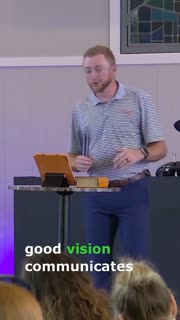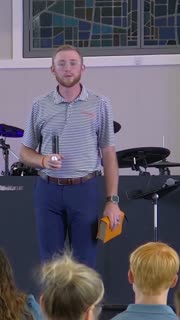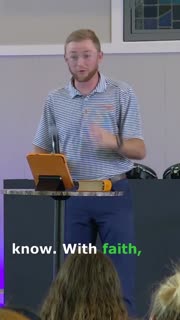Seeing God's Promises Amidst Conflict and Uncertainty
Devotional
Sermon Summary
Bible Study Guide
Sermon Clips
### Quotes for Outreach
1. "How do we lead our families through this fog? I think the only way that us men can truly and impactfully lead our families through this fog, or even if you win, maybe there are some women in this room or women watching online that have to be the man and the woman of the family. Praise God for those too. How do we lead our families through this fog? I think the only way that we can lead our families through, through the times in which we live in today, the fog that we see, the culture we live in, is by having good vision." (17 seconds)
2. "We need hope. We need trust. We need faith. We need good vision. How do we navigate the murky waters of this culture in which we live in, aside from good vision? Or can I submit to you today, God vision? A vision from the Lord, eyes that see that which God desires for us to see." (22 seconds)
3. "I want you to know today that we still have a hope, church. I want you to know today that our God is still on the throne. He is not shaken by any political decision. He is not worried about any outcome. He has no doubts. He has no fears. He's not indecisive. He hasn't yet to make his mind up. No, God is sure and he is dependable. We have a hope in Jesus." (26 seconds)
4. "Waiting on the Lord looks less like kicking your feet up and being comfortable. It looks more like being more intentional and putting a rag over, and saying, how may I serve you? This is waiting on the Lord. This is what it looks like to wait on the Lord. How may I serve you, Lord?" (18 seconds)
5. "We are in a time, we are in a time in history when it's very easy to waver to the left or to the right. I don't mean that politically. I mean that figuratively about our walk with Christ. As we walk forward, as we progress forward, as we run the race of faith, it's easy to get tired or weighed down or tired of faith. Or pushed down by our world today that we just either fall or we go to the left or to the right." (36 seconds)
### Quotes for Members
1. "Good vision concludes conflict, and not in the sense that the conflict is no more, but in the sense that you've come to a conclusion that no matter what, I trust Jesus. Good vision concludes conflict. Let me bring you up to date of what's happening here in the book of Habakkuk. I don't know if you've ever read this book. Half of us can't even say the name right, and I couldn't for the longest, but Habakkuk is such a short book." (29 seconds)
2. "Conflict distracts, does it not? And isn't that the biggest tactic that the enemy has against us? Distraction. If he can have the Christian, or more namely for today, the father of the household distracted, turned to the wayside, he's got the family. I should have pulled the statistics back up. I preached this not long ago in a sermon series called Home Team with God's family plan. You remember the yo-yo family concept and how worship and praise bring glory to the Lord and God's plan for the family." (38 seconds)
3. "Good vision communicates clearly. Habakkuk chapter two, verses two and three says this. Then the Lord answered me and said, write down the vision and inscribe it clearly. Somebody say clearly. On tablets so that one who reads it will be able to see it clearly. and the man who reads it may run. In other words, get to work or may understand the word of the Lord and get going. For the vision is yet for the appointed time. It hurries towards the goal and it will not fail though it delays. Wait for it, somebody say wait for it. For it will certainly come and it will not delay." (36 seconds)
4. "I think the reason men don't come to church anymore, and I'm looking out here and I see you men in here and I praise God that I get to see your face every week. You're some good men of God in this room. I want you to know that. I think highly of you. I think highly of the men of God that are sitting in this room today. I look all around this room and I see a bunch of familiar faces. That's good that you're a man and you're familiar at church because it's not that way at a lot of churches." (23 seconds)
5. "With faith, you don't know which way God's going to turn you. You just know that when God turns you, you got it. You got to go. And likewise, with the world, if your faith is in other things, if you are idolizing other things or if you're following other things, if you've made other things your God, they'll turn you other directions when the Lord says, no, a good vision will always come from a God connection. He's our way maker, church. He's the promise keeper. He's the light in the darkness." (39 seconds)
Ask a question about this sermon
1. "How do we lead our families through this fog? I think the only way that us men can truly and impactfully lead our families through this fog, or even if you win, maybe there are some women in this room or women watching online that have to be the man and the woman of the family. Praise God for those too. How do we lead our families through this fog? I think the only way that we can lead our families through, through the times in which we live in today, the fog that we see, the culture we live in, is by having good vision." (17 seconds)
2. "We need hope. We need trust. We need faith. We need good vision. How do we navigate the murky waters of this culture in which we live in, aside from good vision? Or can I submit to you today, God vision? A vision from the Lord, eyes that see that which God desires for us to see." (22 seconds)
3. "I want you to know today that we still have a hope, church. I want you to know today that our God is still on the throne. He is not shaken by any political decision. He is not worried about any outcome. He has no doubts. He has no fears. He's not indecisive. He hasn't yet to make his mind up. No, God is sure and he is dependable. We have a hope in Jesus." (26 seconds)
4. "Waiting on the Lord looks less like kicking your feet up and being comfortable. It looks more like being more intentional and putting a rag over, and saying, how may I serve you? This is waiting on the Lord. This is what it looks like to wait on the Lord. How may I serve you, Lord?" (18 seconds)
5. "We are in a time, we are in a time in history when it's very easy to waver to the left or to the right. I don't mean that politically. I mean that figuratively about our walk with Christ. As we walk forward, as we progress forward, as we run the race of faith, it's easy to get tired or weighed down or tired of faith. Or pushed down by our world today that we just either fall or we go to the left or to the right." (36 seconds)
### Quotes for Members
1. "Good vision concludes conflict, and not in the sense that the conflict is no more, but in the sense that you've come to a conclusion that no matter what, I trust Jesus. Good vision concludes conflict. Let me bring you up to date of what's happening here in the book of Habakkuk. I don't know if you've ever read this book. Half of us can't even say the name right, and I couldn't for the longest, but Habakkuk is such a short book." (29 seconds)
2. "Conflict distracts, does it not? And isn't that the biggest tactic that the enemy has against us? Distraction. If he can have the Christian, or more namely for today, the father of the household distracted, turned to the wayside, he's got the family. I should have pulled the statistics back up. I preached this not long ago in a sermon series called Home Team with God's family plan. You remember the yo-yo family concept and how worship and praise bring glory to the Lord and God's plan for the family." (38 seconds)
3. "Good vision communicates clearly. Habakkuk chapter two, verses two and three says this. Then the Lord answered me and said, write down the vision and inscribe it clearly. Somebody say clearly. On tablets so that one who reads it will be able to see it clearly. and the man who reads it may run. In other words, get to work or may understand the word of the Lord and get going. For the vision is yet for the appointed time. It hurries towards the goal and it will not fail though it delays. Wait for it, somebody say wait for it. For it will certainly come and it will not delay." (36 seconds)
4. "I think the reason men don't come to church anymore, and I'm looking out here and I see you men in here and I praise God that I get to see your face every week. You're some good men of God in this room. I want you to know that. I think highly of you. I think highly of the men of God that are sitting in this room today. I look all around this room and I see a bunch of familiar faces. That's good that you're a man and you're familiar at church because it's not that way at a lot of churches." (23 seconds)
5. "With faith, you don't know which way God's going to turn you. You just know that when God turns you, you got it. You got to go. And likewise, with the world, if your faith is in other things, if you are idolizing other things or if you're following other things, if you've made other things your God, they'll turn you other directions when the Lord says, no, a good vision will always come from a God connection. He's our way maker, church. He's the promise keeper. He's the light in the darkness." (39 seconds)
